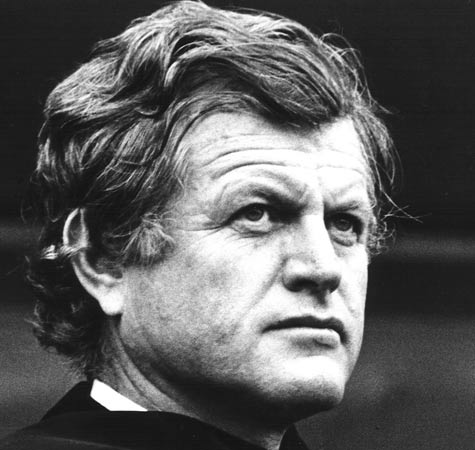
Photo: Teri Bloom |
This article originally published in the December 18, 1979 issue of the Boston Phoenix.

Philandering, like heavy drinking, traditionally has been one of those activities that the boys in the press keep mum about when reporting on the boys on the Hill, or the boy in the White House, or any boy, for that matter. The rationales for this silence are curiously contradictory. First of all, there is the code of the winking, chuckling fraternity of J. P. Donleavy naughty fellas, the motto of which is "Boys will be boys." Second, there is the fastidious gentleman's code that holds that the private lives of politicians should be off limits, that what counts are the serious matters, such as a man's position on issues, and that only a very sleazy and trivial reporter would lower himself to write about that sort of dirt. And third, there is the tacit agreement among the sophisticated people of the press to protect the great mass of unsophisticated voters whose simple lives and naïve, puritanical beliefs would render them incapable of understanding such information properly. They would be excessively shocked, they would overreact, and the political process would be distorted by irrelevancies.
Things have changed slightly in recent years. Jack Kennedy's philandering was known to members of the press but kept secret. It was passed on to the public only as an aura of dashing charisma. In contrast, the philandering of his brother Edward seems to have been taking for granted as a matter of indifference. Even Kennedy himself hardly bothers to deny it, and the press, while refraining from directly addressing the subject (except for Chappaquiddick), doesn't suppress it either. The press just treats it in a way that assumes it is so and at the same time implies that it is of no importance. This new, half-hearted discretion is, I would guess, partly the result of confusion brought about by the collision of two opposed systems of values: the old codes, weakened but still inhibiting, and the new permissiveness of the 1960s and 1970s, which includes a "non-judgmental" attitude toward the sex lives of others.
Of the three reasons for journalistic restrain in such matters, protection of privacy is the only valid principle. But it is a powerful one. The private life of any person should not be exposed against his or her will except for the most compelling reasons. I do not think that voters need to be shielded by the press from information they may interpret in a way the press disapproves of, but in the case of a typical legislator I would not write about his private life because I believe that his entitlement to privacy outweighs the need to know.
But the case of a presidential candidate is altogether different. First, as is now widely accepted, the character of a president has enormous significance because of his great personal power and the sensitive ways in which he can use it. Second, a presidential candidate is asking for a much greater mandate from the citizenry, and so he must tolerate a much greater sacrifice of his privacy. Therefore I believe that despite our distaste for going into this sort of thing, our reluctance to judge others, and the importance of the principle of privacy, Ted Kennedy's reputation as a philanderer should be publicly discussed as a legitimate issue in the campaign.
All this presupposes, of course, that philandering is a type of pathological behavior. Here, I think, the age of the person and the style of philandering are important. Within the world of politics and journalism, Kennedy's womanizing is widely known – to the many women who themselves have been approached, for example, and to reporters and others who have been around Kennedy and have seen the pattern in action. While is was talking to people for this article, it seemed as if almost everybody in the world has another anecdote to offer. There is a pattern to these anecdotes. The type of womanizing that Kennedy is associated with is a series of short involvements – if they can be called that – after which he drops the woman. Sometimes he hasn't even met her previously. She has been picked out by one of his cohorts as the type of woman who appeals to him and asked if she would like to have a "date" with the senator. The idea evidently is lunch and a dalliance, over and out, on the pressing schedule. The picture does not exclude longer relationships, but the short-term pattern apparently is a deep part of Kennedy's nature, as well as an image that Kennedy seems to in some way to enjoy, as though he believes that it adds to his attractiveness. In the eyes of some, perhaps it does.